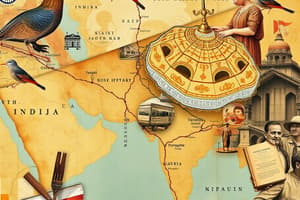Podcast
Questions and Answers
Who was the first European to establish a direct sea route from Europe to India?
Who was the first European to establish a direct sea route from Europe to India?
Vasco da Gama.
What was the primary focus of the East India Company when it was established?
What was the primary focus of the East India Company when it was established?
Trade.
Which European power conquered Goa, leading to its status as a colony?
Which European power conquered Goa, leading to its status as a colony?
Portugal.
What was one significant economic impact of European colonization in India?
What was one significant economic impact of European colonization in India?
When did the British Crown take direct control over India, following the rule of the East India Company?
When did the British Crown take direct control over India, following the rule of the East India Company?
Which trading company was established by the Dutch in 1602?
Which trading company was established by the Dutch in 1602?
List one cultural impact of European arrival in India.
List one cultural impact of European arrival in India.
What was a key political outcome of European colonization in India?
What was a key political outcome of European colonization in India?
Flashcards are hidden until you start studying
Study Notes
Early European Explorers in India
- Vasco da Gama (1498): First European to establish a direct sea route from Europe to India, landing at Calicut (now Kozhikode) in Kerala.
- Portuguese: Established trade relations with Indian kingdoms, particularly in western India.
- Alfonso de Albuquerque (1505): Conquered Goa, which became a Portuguese colony and a base for further exploration.
European Trading Companies in India
- East India Company (EIC) (1600): English trading company established in India, initially focused on trade, but eventually became a powerful force in Indian politics.
- Dutch East India Company (1602): Dutch trading company active in India, primarily in the spice trade.
- French East India Company (1664): French trading company established in India, competing with the EIC.
European Colonization in India
- Portuguese Colonies (1505-1961): Goa, Daman, Diu, and Nagar Haveli remained under Portuguese control until 1961.
- French Colonies (1664-1954): French established colonies in Pondicherry, Chandannagar, and other territories, which were eventually returned to India in 1954.
- British Colonization (1757-1947): EIC's military victories led to the establishment of British rule in India, with the Company governing large parts of the subcontinent until 1858, when the British Crown took over.
Impact of European Arrival in India
- Economic Impact: European trade and colonization led to the exploitation of Indian resources, the decline of traditional industries, and the introduction of new crops and agricultural practices.
- Cultural Impact: European influence led to the adoption of Western customs, education, and technology, as well as the suppression of Indian culture and traditions.
- Political Impact: European colonization led to the eventual collapse of Indian kingdoms and the emergence of India as a unified nation-state.
Early European Explorers in India
- Vasco da Gama reached Calicut in 1498, marking the first direct sea route from Europe to India.
- The Portuguese established trade relations with various Indian kingdoms, focusing on the western region.
- Alfonso de Albuquerque seized Goa in 1505, which became a vital Portuguese colony and strategic base for further exploration.
European Trading Companies in India
- The East India Company (EIC), founded in 1600, started as a trading enterprise but grew to wield significant political influence in India.
- Dutch East India Company (1602) engaged primarily in the spice trade, participating actively in Indian commerce.
- The French East India Company was established in 1664 to compete with both the EIC and the Dutch, expanding France's trade interests in India.
European Colonization in India
- Portuguese territories, including Goa, Daman, Diu, and Nagar Haveli, remained under Portuguese control until 1961.
- French colonies, such as Pondicherry and Chandannagar, existed until their return to India in 1954 after colonial rule ended.
- British colonization began after the EIC's military successes from 1757, with British control solidified after the 1858 transfer of governance from the company to the Crown.
Impact of European Arrival in India
- Economic exploitation increased due to European trading practices, leading to the decline of traditional industries and the introduction of new agricultural methods.
- Cultural influences resulted in the adoption of Western customs and education, while Indigenous cultures faced suppression.
- Politically, European colonization contributed to the collapse of established Indian kingdoms, facilitating the rise of India as a unified nation-state.
Studying That Suits You
Use AI to generate personalized quizzes and flashcards to suit your learning preferences.




